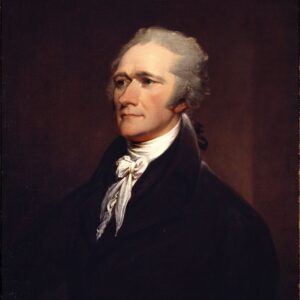Alexander Hamilton was born on the Leeward Islands on January 11th, 1755, or 1757. As a child, Hamilton already showed signs of great intelligence. Sadly, his parents died early on. Therefore, his neighbors sent him to mainland America. He studied at a grammar school in New Jersey and later at King’s College in New York. Furthermore, he gained respect for his writing skills.
Additionally, he joined the militia to help fight in the Revolutionary war (1775-1783). The young captain proved himself well and joined George Washington’s staff. Hence, his reputation rose to the sky. After the war, he joined the Continental Congress. However, he left the office a year later to work in law and finances.
Alexander Hamilton was very successful. For example, he founded the Bank of New York, the most lasting still-existing bank in the country. Hamilton also helped restore his alma mater, the King’s College. Despite that, he returned to politics.

✟ July 12, 1804, New York, USA
In 1787, Hamilton served as a delegate of New York to the Constitutional Convention in Philadelphia and was also a member of the Second Continental Congress. He believed the country ought to be a republic with a strong federal government. Besides, he grouped with James Madison and John Jay to write The Federalist Papers, which they used to support the constitution. During the summer of 1788, Hamilton helped ratify it. He was a pivotal figure in the process. As a result of his work, Hamilton is known to be one of the “architects” of modern republicanism.
Alexander Hamilton, US citizen
Further, he founded the Federalist Party to support his policies. George Washington appointed him the first secretary of the treasury in 1789. Hamilton once again made an impact. For example, he shaped the financial system and introduced federal taxes. Moreover, he founded a national bank and a mint. However, Hamilton stepped down in 1795. In 1800, he turned against president John Adams, a member of his party.
Aaron Burr, the vice-president of Thomas Jefferson, was Hamilton’s life-long rival. Aaron Burr wanted to become president himself, but Hamilton helped push Jefferson to victory. Thus, the dispute between the two politicians grew. The whole conflict ended in 1804 in a duel where Burr shot Alexander Hamilton.
One of the greatest politicians and philosophers in US history, a Founding Father, died a day after the duel, on July 12th, 1804, in New York.
“Those who stand for nothing fall for everything.”
Alexander Hamilton
